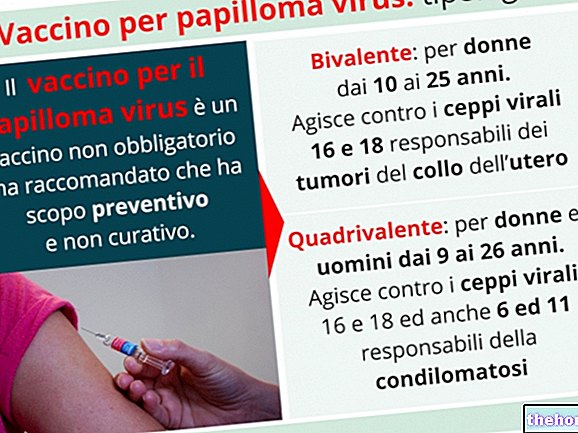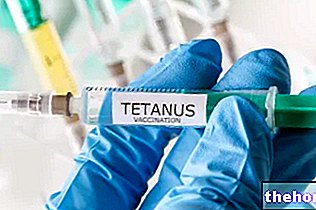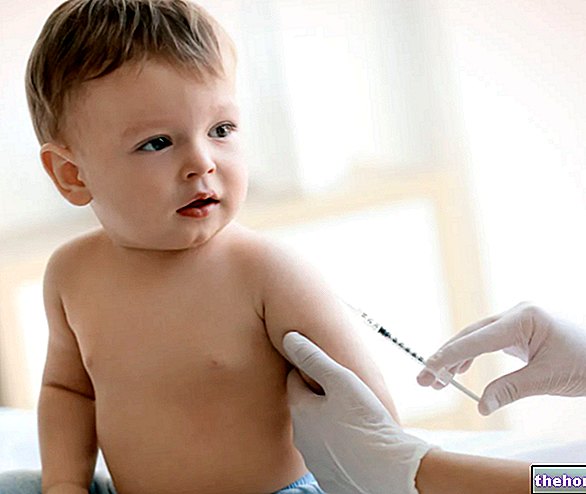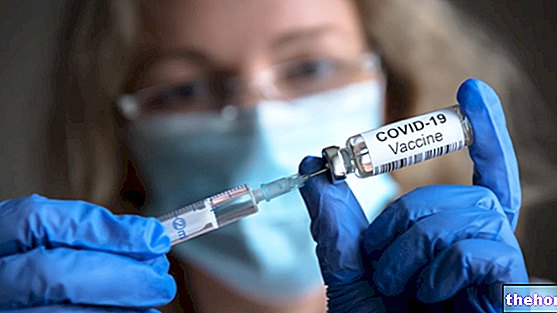Generality
Vaccines in children are a fundamental and effective means of preventing the onset of serious infectious diseases, the complications of which can be very serious and, at times, even fatal.

What are Vaccines?
Vaccines are special preparations, administered parenterally or orally in order to induce an "immunization against certain types of microorganisms.
The vaccine may contain the microorganism against which immunization is to be obtained, or it may contain proteins or toxins deriving from this same microorganism.
Basically, there are three different types of vaccines:
- Live attenuated vaccines: they contain live microorganisms (bacteria or viruses) against which immunization is to be obtained, whose pathogenic power has however been decreased.
- Inactivated vaccines: they contain the bacteria or viruses against which the patient is to be immunized; however - unlike what happens with live attenuated vaccines - their ability to cause disease has been eliminated in these microorganisms.
- Vaccines purified to subunits: they contain proteins or toxins deriving from the microorganisms against which the individual is to be immunized.
Once the vaccine has been administered, an immune response is activated in the individual characterized by the production of antibodies (or immunoglobulins, if you prefer) by the lymphocytes.
Generally, a period of time ranging, approximately, from two to four weeks is required to achieve complete immunization.
In any case, for more detailed information about vaccines and their mechanism of action, see the dedicated article "Vaccine - Vaccination".
Mandatory and Recommended Vaccines
In Italy, there is the possibility of free vaccinating children against various types of infectious diseases considered serious. For some of these diseases, the obligation to vaccinate has been introduced, while for others the obligation is not foreseen, but the Ministry of Health still recommends vaccination.
The list of free vaccinations provided by the State, as well as the timing with which these must be carried out, are included in the so-called vaccination calendar.
The vaccination calendar and the lists of mandatory and recommended vaccines in children are shown on the website of the Ministry of Health and can be consulted at the following link.
Vaccines Compulsory
Until 2017, there were only four vaccines in children made mandatory by the Ministry of Health in Italy; in particular, those aimed at the prevention of the following diseases:
- Diphtheria: Diphtheria is caused by the bacterium Corynebacterium diphtheriae, which infects the airways and skin causing cardiac, renal and neurological complications. Infection supported by C. diphtheriae it can be fatal if not promptly and properly treated.
The vaccine - consisting of diphtheria toxin (made harmless through special techniques) produced by the bacterium responsible for the "infection - must" be administered in three doses during the first year of life, followed by two boosters made one at 5-6 years and the other between the ages of 11 and 18. Thereafter, further recall is recommended every 10 years. - Hepatitis B: Hepatitis B is a disease that affects the liver, triggered by a "viral infection supported by the hepatitis B virus" (or HBV). Many children who contract the virus have no symptoms, but they can become chronic carriers.
The hepatitis B vaccine contains a protein typically produced by the virus and synthesized through recombinant DNA techniques.
The vaccination schedule provides for the administration of the vaccine in three doses: the first in the third month of life, the second in the fifth month of life and the third between the eleventh and thirteenth month of life. - Poliomyelitis: Polio is an infectious disease caused by the poliovirus. In truth, in most cases the poliovirus infection is asymptomatic. However, there are still cases in which the infection manages to affect the nervous system, causing muscle weakness and paralysis, even permanent. In severe cases, poliomyelitis can even lead to the death of the patient.
The polio vaccine contains the inactivated virus and must be given in three doses during the child's first year of life, then a booster should be performed between the ages of five and six. - Tetanus: Tetanus is an infectious disease caused by the toxins produced by the bacteria Clostridium tetani. This infection affects the nervous system and the musculoskeletal system, causing the so-called spastic paralysis, which, if not properly treated, can lead to death.
The tetanus vaccine contains the tetanus toxin rendered harmless.
The vaccination schedule provides that this tetanus vaccine is administered in three doses within the first year of the child's life, which must be followed by two boosters to be carried out, respectively, between the ages of 5 and 6 and between the ages of 11 and 18.
Usually, the tetanus vaccine is given concurrently with the diphtheria vaccine.
What changes from 2017
With the decree law on vaccination prevention for minors from zero to 16 years, approved on 28/07/2017, compulsory and free vaccinations increase from four to ten; in addition to those already seen
- anti-poliomyelitis;
- anti-diphtheria;
- anti-tetanus;
- anti-hepatitis B;
the compulsory vaccination is added for those vaccinations which, previously, were not compulsory but still strongly recommended:
- whooping cough
- meningitis (Haemophilus influenzae type B)
- measles;
- rubella;
- mumps;
- chickenpox
We also remind you that:
- the ten compulsory vaccinations become a requirement for admission to kindergarten and preschools (for children from 0 to 6 years)
- the violation of the vaccination obligation entails the application of significant financial penalties.
The ten vaccinations listed must all be compulsorily administered to those born after 2017. For those born before 2017, see the next chapter.
Before 2017
Those born between 2001 and 2016 must be given the vaccinations contained in the National Vaccination Calendar for each year of birth. Precisely:
- those born between 2001 and 2004, must carry out (if they have not already done so) the four vaccinations already required by law (anti-hepatitis B; anti-tetanus; anti-poliomyelitis; anti-diphtheria) and "anti-measles, the anti -mumps, the "anti-rubella, the" anti-pertussis and the "anti-Haemophilus influenzae type b, recommended by the 1999-2000 National Vaccine Plan
- those born between 2005 and 2011 must carry out, in addition to the four vaccinations already imposed by law, also "anti-measles," anti-mumps, anti-rubella, "pertussis and" anti-Haemophilus influenzae type b, provided for in the vaccination calendar included in the 2005-2007 National Vaccine Plan
- those born between 2012 and 2016 must carry out, in addition to the four vaccinations already imposed by law, also the "anti-measles, the" anti-mumps, the "anti-rubella, the" anti-pertussis and the "anti-Haemophilus influenzae type b, provided for in the vaccination calendar included in the 2012-2014 National Vaccine Prevention Plan
The following are exempt from the vaccination obligation:
- subjects immunized as a result of the natural disease. For example, children who have already contracted chickenpox will not have to be vaccinated against this disease
- subjects who are in specific documented clinical conditions, certified by the general practitioner or pediatrician of free choice. For example, for subjects who have had previous severe allergic reactions to the vaccine or to one of its components
Recommended vaccines
As mentioned, some vaccines against certain infectious diseases are not mandatory, but the Ministry of Health still recommends carrying them out, as these diseases can have very serious complications.
As with mandatory vaccines, recommended vaccines are free.
The infectious diseases for which the Ministry of Health recommends childhood vaccinations are:
- Meningitis (vaccines against pneumococcus, meningococcus C and againstHaemophilus influenzae type B);
- Measles;
- Mumps;
- Whooping cough;
- Rubella;
- Chickenpox.
- Rotavirus infections
As we have seen, some of these vaccinations have become mandatory for children born in recent times (see previous chapter).
In addition, the Ministry of Health recommends vaccinations against human papillomavirus (or HPV) infections in girls and makes it free of charge within 12 years of age.
The papillomavirus infection, in fact, is a sexually transmitted infection that in women can cause lesions that then lead to the onset of cancer of the cervix. It is precisely for this reason that the vaccination must be carried out within twelve years, therefore before the beginning of the woman's sexual life.




























